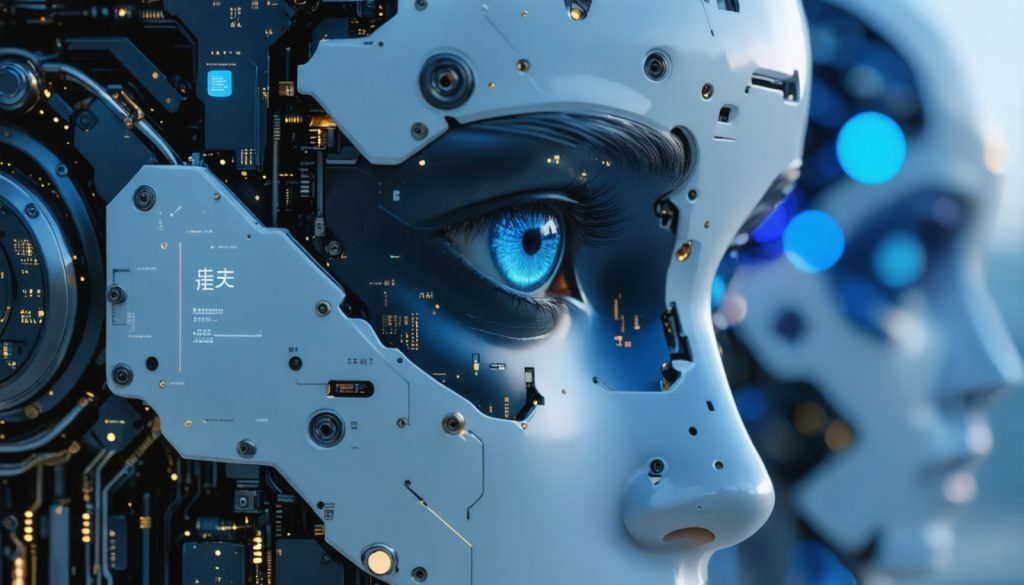
- Artificial Intelligence (AI) is rapidly transforming industries by enhancing diagnostics, optimizing financial systems, and revolutionizing manufacturing.
- Global AI investments reached $100 billion in 2023, highlighting its unstoppable momentum.
- Ethical concerns around AI include data privacy, bias, accountability, and job displacement.
- China leads with a pioneering approach, integrating ethics into its AI strategy through the Next Generation AI Development Plan.
- Key measures include data desensitization strategies and comprehensive ethical guidelines to balance innovation with privacy.
- China collaborates globally, partnering with the EU and participating in IEEE and ISO, to shape ethical AI standards.
- China invests $20 billion in ethical AI research, promoting collaboration and transparency in AI decision-making.
- The rise of AI drives a paradigm shift, emphasizing the need for new skills in strategic thinking and creativity within the workforce.
- The overarching goal is balancing AI innovation with ethical responsibility, ensuring technology enriches human potential without compromising values.
Against the backdrop of a technological revolution, artificial intelligence (AI) surges ahead, radically reshaping industries and societal interactions at breakneck speed. The transformative power of AI is vividly evident — from healthcare diagnostics that unravel diseases with unerring precision to financial systems optimizing market efficiencies and robotic assemblies revolutionizing manufacturing efficiency. With global AI investments skyrocketing to a staggering $100 billion in 2023, this technological juggernaut shows no sign of slowing.
However, as AI’s influence grows, so do concerns over the ethical shadows it casts. Questions around data privacy, algorithmic bias, accountability in decision-making, and the potential for widespread job displacement ignite spirited debates among policymakers and technologists alike. How do we harness this technological prowess while ensuring safeguards align with societal values?
In this turbulent landscape, China emerges as a pivotal actor with a bold approach towards ethical AI governance. The world watches as China embarks on an ambitious journey, weaving ethical frameworks into its AI development strategy. Guided by the Next Generation AI Development Plan, China is not only accelerating tech innovation but also establishing ethical boundaries aimed at mitigating AI’s potential risks.
Key to this approach is the implementation of nuanced data desensitization strategies. By meticulously grading data based on sensitivity, China seeks to foster a balance between robust technological development and data privacy—a challenge that has stymied many nations. This regulatory foresight extends to comprehensive ethical guidelines designed to ensure AI systems are transparent, reliable, and aligned with human values.
Beyond its borders, China engages in global dialogues, partnering with international bodies and nations, such as the European Union, to shape and standardize ethical AI norms. By actively participating in committees like IEEE and ISO, China seeks to not only adhere to but also influence the global discourse on AI governance.
Yet, China’s ambitions are intrinsically linked to tangible actions. With a remarkable $20 billion earmarked for ethical AI research, alongside policies promoting public-private sector collaboration and mandating transparency in AI decision-making, China sets a potent example of how a nation can spearhead technological advancements without sacrificing ethical standards.
The broader implication for global industries is a paradigm shift. As AI continues to permeate sectors like finance, transportation, and healthcare, the workforce finds itself evolving. Tasks once seen as routine are now automated, driving a demand for new skills centered around strategic thinking and creativity. The ethical navigation of AI’s deployment becomes critical, ensuring advancements do not come at the expense of fairness or privacy.
In this pivotal era of human-machine coalescence, a profound takeaway emerges: the need for a delicate balance between innovation and ethical responsibility. As countries like China forge ahead, they illuminate paths that others may follow. Their actions underscore the urgent necessity of forging a future where AI serves humanity’s best interests, driving prosperity while upholding the bedrock principles of integrity and equity.
In a time of rapid change, the choices made today will echo through the decades to come. The ethical fabric we weave now will dictate the legacy of the AI era, shaping a world where technology augments human potential without compromising the values we hold dear.
AI’s Meteoric Rise: Balancing Innovation with Ethics
Exploring AI’s Transformative Impact
Artificial intelligence continues to surge ahead, radically reshaping industries and societal interactions at an unprecedented pace. It’s not merely a technological trend, but a juggernaut influencing various sectors. By 2023, global AI investments have soared to $100 billion, showcasing its profound impact. Let’s delve into additional insights about AI’s ethical challenges, its global landscape, and how we can harness its potential responsibly.
Expanding AI’s Horizons: Facts Beyond the Headlines
How AI is Reshaping Industries
– Healthcare: AI-driven diagnostics are revolutionizing patient care by enabling early disease detection and personalized medicine. For example, AI algorithms can analyze vast datasets to predict outbreaks or assess treatment efficacy.
– Finance: AI optimizes trading strategies, reduces operational costs, and enhances fraud detection capabilities. Algorithms can process complex financial data faster than human analysts.
– Manufacturing: Robotics improve precision and efficiency in production lines, leading to lower error rates and increased output.
Ethical Challenges and Governance
As AI continues its ascent, ethical challenges grow. Here are some pressing concerns:
– Data Privacy: AI algorithms rely on massive datasets, often including sensitive personal information. Ensuring privacy requires robust data anonymization techniques and legislative frameworks.
– Algorithmic Bias: AI systems can perpetuate or even exacerbate biases present in training data. Transparent algorithms and diverse training datasets are vital in mitigating this.
– Job Displacement: Automation creates efficiency but also economic disruption. Reskilling programs become essential to help displaced workers transition into new roles.
China’s Role in Ethical AI Development
China stands out with its notable ethical AI strategies, which have global implications:
– Next Generation AI Development Plan: This initiative underscores China’s commitment to advancing AI while adhering to ethical standards.
– Data Desensitization: By categorizing data by sensitivity, China aims to balance technological advancement with privacy concerns. Such strategies could serve as a blueprint for other nations.
– Global Dialogue and Influence: Through partnerships with entities like the EU, IEEE, and ISO, China actively shapes international AI governance standards.
Real-World Use Cases and Market Trends
– Insurance and Risk Management: AI improves predictive analytics, optimizing underwriting processes and risk assessment.
– Autonomous Vehicles: AI powers self-driving technologies, promising safer and more efficient transportation.
The AI market shows no signs of slowing. According to Gartner, AI is predicted to contribute trillions to the global economy by 2030.
Navigating AI Ethically: Practical Tips
1. Prioritize Transparency: Companies should ensure AI systems are explainable, enabling users to understand how decisions are made.
2. Invest in Education: Encourage training programs that elevate digital literacy and technical skills.
3. Collaborate Globally: Engage with international AI governance efforts to develop shared ethical standards.
Conclusion: Charting an Ethical AI Future
The future of AI hinges on our ability to innovate while upholding ethical standards. As countries like China lead the way, others must also prioritize transparency, fairness, and privacy in AI development. The decisions made today will define the AI legacy, ensuring technology enhances human life without compromising core values.
For more insights on AI advancements, visit OpenAI and explore how AI is reshaping the world.



